For the first time since it was founded 11 years ago, the narrative films competing for awards at the Tribeca Film Festival made up a noteworthy and motley bunch, and it was a real race. Usually gems by an unknown filmmaker made without any stars can be discovered in the various sidebars, but this year, the competition section gave documentaries, typically the strongest section in the entire festival, a run for their money.
Outside of the competition’s limelight, strong works appeared in the catch-all Viewpoints section, such as the revelatory and powerful documentary The Kill Team, which won the top documentary prize. For film buffs, Big Joy: The Adventures of James Broughton is a have-to-see. The late Bay Area-based pagan and ageless hippie filmmaker is not very well known, even among film critics. Fewer still knew that he had had a relationship with Pauline Kael before her New Yorker stint. (However, he was recognized during his lifetime. Broughton was awarded a special prize at Cannes in 1955.)
Overall, the programming has become pickier. The number of films has shrunk in size from its earlier days but variety remains strong—though there are still a few empty-calories efforts with star names that lure photographers to the red carpet, vanity projects really, like director/lead actor Clark Gregg’s retread of a classic Hollywood satire Trust Me. (Alternatively, if you want to see a 65-minute compilation of adorable cat videos, then look for Lil Bub and Friendz. Be ready to say “Aaaaaw.”)
Yet during the past decade, the festival’s various juries have gotten it right, and an award has served as an important recognition for an emerging filmmaker. Case in point is Clio Barnard, who won the best documentary prize in 2010 for The Arbor. She premiered her first feature, The Selfish Giant, to much critical acclaim this year at Cannes, and she’s recognized as one of the most important new British filmmakers.
There were unquestionably plenty of films that would fit the label “serious cinema” by any definition of the term—works driven by a singular point of view, potentially polarizing, with nil commercial prospects that need to rely on word of mouth and critics for a life after the festival. That is to say, films that wouldn’t be out of place in the lineup at Cannes and Venice. The transgressive Six Acts would fit right in at either festival for its frankness and ability to make the audience squirm. For its blunt depiction of teenage sexuality, expect walkouts.
This loaded debut film by Israeli Jonathan Gurfinkel shares the harsh and unsparing point of view of Ulrich Seidl and Michael Haneke. (The latter, by the way, was the subject at Tribeca of the chatty documentary Michael H. Profession: Director, which catches audiences up to speed on his body of work.) This gritty, voyeuristic film is also part of a trend in Israeli cinema to look inwardly at the contemporary values of the land of milk and honey. It joins a select group with Policeman, or perhaps the under-appreciated film from Venice last year, The Cut-Off Man.
We find out only a little about the personal life of 16-year-old Gili (the remarkable Sivan Levy). She has just transferred to a new high school for some vague reason, her dad is passed out on the couch when she comes home late, she treats her mother with scalding contempt, and disobeys her when she goes out for the night—a lot. She stands out in a crowd, wearing short shorts and skimpy tops, with a shock of pink streaking her dark Betty Page hairstyle.
The title refers to the number of sexual encounters between Gili and a clique of rich kids one year ahead of her. The leader of the brat pack, a preening hot jock, uses his looks and charm to bend Gili to his bidding. All it takes is for him to coo that she looks sexy, but she’s not necessarily naïve. She knows what the boys want, and that that’s all they want since they treat her horribly, passing her off from friend to friend. Yet she always returns for the next party. If she just wanted sex, she would have moved on and not returned their calls, instead of rationalizing each humiliation. Well executed, painful to watch, and so well acted, Six Acts is disturbing because it’s so convincing. The tyranny of popularity among high schoolers has rarely been depicted so brutally. It’s a different kind of teen horror movie.
Because of a cast headed by Naomi Watts and Matt Dillon, Sunlight Jr. has the potential to reach audiences outside of festivals, especially via video on demand. Cast against type, Watts plays a minimum-wage convenience store cashier who just got out of an abusive relationship with a drug dealer. She now lives in Section 8 housing with wheelchair-bound, unemployed heavy drinker Rich (Matt Dillon, in his most layered performance since Crash).
Watts plays Melissa with wry resignation. No matter what efforts she makes, she’s always back to square one. However, Watts’ complexion and her well-toned body, which you’ll see plenty of, contradicts Melissa’s diet of cheap, processed food, and her slovenly mother is one whiskey sip away from turning into a welfare queen stereotype. Yet Melissa has many dimensions, freeing her from becoming a poster child for social ills. Despite the issues piled onto the plot, the tone is straightforward and the script handles the subject matter with restraint and maturity. Writer/director Laurie Collyer was influenced by Barbara Ehrenrich’s nonfiction exposé book about working class conditions, Nickel and Dimed: On (Not) Getting By in America, and she responds with an atypical American social realist film that offers a low-key and somber look at the country’s underclass.
Another world premiere entry, Bluebird, focused on a similar social milieu, but Down East, in a wintry rural Maine hamlet both void of job opportunities and a deathbed of dashed dreams. For an elementary school bus driver, one moment of distraction ruins her along with her working-class family. The pervasive heavy-handed mood is so bleak that even when a young woman gets high and drunk, she cries.
The ensemble is certainly exceptional: John Slattery, Margo Martindale, Amy Morton, and the rising Louisa Krause. All actors wipe away memories of their previous on-screen personas, but without a variation in the film’s morose tone, it comes off as a slice of rust belt misery. In a case of enough-already, the song “Tragedy” sung by the Fleetwoods plays over the closing credits. Although it came up empty-handed of awards at Tribeca, four of the film’s actresses shared the best actress prize at the recent Karlovy Vary Festival.
Tribeca’s best actress honor went to Veerie Baetens in the hip, sensual, and sentimental The Broken Circle Breakdown. (It’s too subtle, well acted, and cool to be called a tearjerker.) A colleague hit it on the mark: the teary drama’s a country-and-western ballad brought to life: love at first sight, smoldering sex, a baby daughter, tragedy and recriminations. Think of it as an updated Penny Serenade for the tattooed set. Art imitates art in other ways, too. The film’s couple is in a bluegrass band with original songs that would make Bill Monroe proud. This movie proves, once again, that American pop culture is the country’s best ambassador. Like about a dozen films at Tribeca, this premiered at Berlin, where it won the Audience Award. It also took the award for best screenplay.
Breaking the somber mood, Taiwan’s Will You Love Me Tomorrow? was a rom-com with teeth. It’s the smartest and most amicable GLBT-themed comedy from Asia in quite some time. As a genre requirement, it posits that a lasting, loving relationship is possible for its four on-the-search-for-love 30-somethings, but maybe not when they expect it. Instead of wish fulfillment, the movie offers pragmatic and down-to-earth advice. It doesn’t conclude like you think it will, and nothing is made easy here for its lead married couple. It will be released by Film Movement later this year.
Tribeca was the perfect launching point for Stand Clear of the Closing Doors, where Ricky, a 15-year-old autistic boy, wanders through New York’s vast underground subway system, which has never looked so otherworldly. The diversity (in every meaning of the word) of the subway extras enhances the film significantly. In some way, the city is the captivating main character.
Ricky has to be told when to eat and needs supervision. Walking home from school, he becomes fascinated by the logo on the back of a man’s jacket and follows the stranger underground. His mother, Mariana (Andrea Suarez), has no idea what has happened to him and takes out her anger on his older sister, who was supposed to make sure her brother made it home, and the father doesn’t want mom to call the police—the parents are undocumented immigrants.
New York-based director Sam Fleischner shot in the Far Rockaway Beach neighborhood of Queens last October, just days before Superstorm Sandy hit the Eastern seaboard, and the disaster became integral to his story. He includes incredible footage of cascading waves and discreet shots of the damage afterwards (no lights are on in the high rise apartments facing the ocean). In many ways, it’s an indirect tribute to the 1951 independent landmark The Little Fugitive, shot not far away on Coney Island. In both, the city becomes a boy’s wonderland. The director brings out strong performances from his mostly non-professional cast, including Jesus Sanchez-Valez, who has Asperger’s, and it earned a special jury mention as the best narrative film.
For the second year in a row, a film that premiered at Berlin and featured a young person in a nightmarish odyssey won the Best Narrative Film award. Last year, Canada’s War Witch, the child soldier saga set during an African civil war, went on to be nominated for the Best Foreign Language Film Oscar. Australian Kim Mordaunt’s feature debut, The Rocket, was filmed in Thailand and Laos (where it’s set) with a local cast. It will most likely represent Australia next year.
Though it has the framework of a coming-of-age tale, this film is pretty intense, even for adults, beginning with the graphic birth of twin boys. Only one survives—Ahlo (child actor Sitthiphon Disamoe won the best actor prize). His village, nestled in the lush mountains, is about to be flooded for the building of a dam, and his family is relocated to a squalid shantytown built on a garbage dump. Food, water, and electricity are scare; it wouldn’t be out of place in a war zone.
The director shifts the tone without diffusing Ahlo’s point of view, moving from a beautiful underwater fantasy sequence to tragedy to effortless child play (the young actors are disarming). In the second half, Ahlo and his patchwork family, now including a James Brown-wannabe and his intrepid niece, find shelter in an abandoned village in the jungle, littered with the remains of unexploded U.S. bombs from 40 years earlier.
Patches of the film follow a predictable route: there’s even a climax with a rocket launching competition, with Ahlo as the only kid among the competitors; he wants to win the prize money to break his family curse of bad luck. Yet the film contains at least two incredibly horrific scenes that are bound to be among the most vivid this year. One involves elephants and live bombs. The director moves the incident-packed story line at an energetic pace; there’s never a dull moment. You’re bound to hear applause as the final credits roll.
Perhaps my favorite film was Jîn, about yet another young person on the lam through manmade destruction. Yes, this set-up was a bona fide trend this year, in addition to Before Snowfall, about another teenager, also a Kurd, smuggling into Europe from Iraq to track down his sister in Sweden. The latter film fulfilled a requirement—it seems at least one film has to deal with honor killings.
From the outset, Jîn (Deniz Hasgüler) sneaks out of a cave during the night, away from her Kurdish fellow fighters, wearing a too-big military uniform. She buries her rifle in a cave and begins a trek through stunning scenery, a mountainous idyll under bombardment by the Turkish military, back to her village. It’s both a war and nature film. Filmed walking up a rocky slope, the 17-year-old girl becomes just a speck in the landscape.
Every frame tells a story, and some episodes stand out more than others. Frequently Turkish-born director Reha Erdem relies heavily on symbolism (Jîn’s at one with nature—all the animals trust her; a mountain lion lets her pass by), yet the parts are greater than the whole. And that one quibble is not to diminish the film’s daring. On her journey, Jîn has to avoid the many men who want to rape her, while evading bombs and capture by the Turkish military. Her mettle shines through in her wary but caregiving encounter with an injured Turkish soldier. All in all, she’s a very empathetic character. As a result, Erdem paints a compassionate portrait of a rebel—one that a U.S. ally, Turkey, would consider a terrorist. You don’t need to be current on Kurdish politics to know what side you’ll learn towards while watching this movie.
As of this date, only The Broken Circle Breakdown, The Rocket, and Will You Still Love Me Tomorrow? will be released in the U.S.

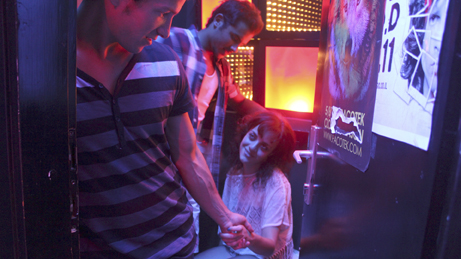
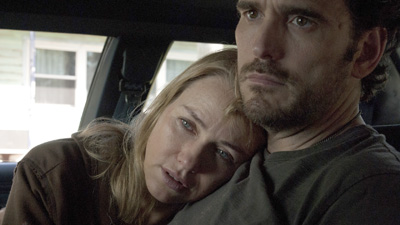
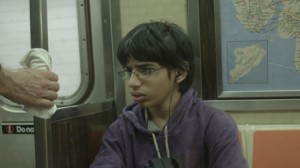

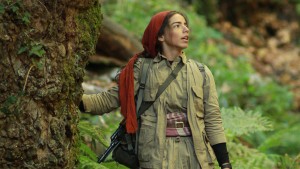
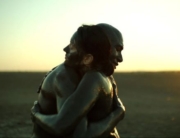



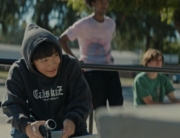
I like the Naomi Watts performance, she is superb!